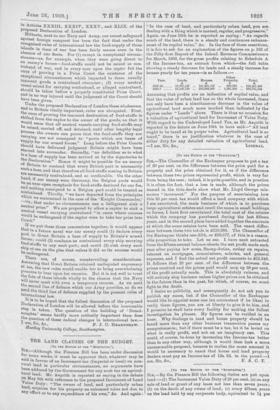[To Till EDITOR OP vas " SPECTATOR:1 SIR,—The Chancellor of
the Exchequer proposes to put a tax. of 20 per cent. on the difference between the price paid for a property and the price obtained for it, as if the difference between these two prices represented profit, which is very far front being the case ; indeed, it is quite possible, and in practice it is often the fact, that a loss is made, although the prices named in the title-deeds show what Mr. Lloyd George mis- names " increment." For the purpose of ascertaining how this 20 per cont. tax would affect a land company with which I ant associated, the main business of which is to purchase large agricultural estates and resell the same in small holdings or farms, I have first ascertained the total cost of the estates which the company has purchased during the last fifteen years, and in the second place have added together the amounts at which the same estates have been sold. The exact differ- ence between these two totals is £150,386. The Chancellor of the Exchequer thinks one-fifth, or £30,077, cf this is a reason- able proportion to take. Let us see. I have next extracted from the fifteen annual balance-sheets the net profit made each year after paying law costs, Stamp-duties, outlay on repairs, interest on mortgages, commissions, salaries, and general expenses, and I find the actual net profit amounts to 251,846. It follows that 20 per cent. of the difference between the prices received and the prices paid would mop up 58 per cent. of the profit actually made. This is absolutely ruinous, and will entirely stop business unless higher prices can be obtained in the future than in the past, for which, of course, we must fight to the death.
I desire no publicity, and consequently do not ask you to publish my name, but if the Chancellor of the Exchequer would like to appoint some one (an accountant if he likes) to verify these figures, you are at liberty to give it to him, and I promise lie shall have every facility for making the fullest investigation he pleases. My figures can be verified in an hour. Why dealings in land and house property should be taxed more than any other business transaction passes my comprehension ; but if there must be a tax, let it be levied on what is really profit, and not on an imaginary one. This could, of course, be done by increasing the Income-tax better than in any other way, although it would then look a more unreasonable proposal, because to realise the same amount it would be necessary to enact that house and land property dealers must pay an Income-tax of 12s. 9d. in the ponnd.—I


























































 Previous page
Previous page